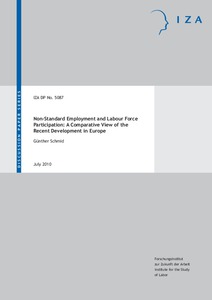Non-standard employment and labour force participation: a comparative view of the recent development in Europe
"This paper presents – in a new way of examination and portrayal – the extent and changes of nonstandard employment relationships (part-time work, fixed-term contracts, and self-employment) in 24 EU member states at two points of time, in 1998 and 2008, on the basis of the European Labour Force...
| Main Author: | |
|---|---|
| Institution: | ETUI-European Trade Union Institute |
| Format: | TEXT |
| Language: | English |
| Published: |
Bonn
2010
IZA |
| Subjects: | |
| Online Access: | https://www.labourline.org/KENTIKA-19184116124919023989-Non-standard-employment-and-la.htm |
| _version_ | 1771659897276989442 |
|---|---|
| author | Schmid, Günther |
| author_facet | Schmid, Günther |
| collection | Library items |
| description | "This paper presents – in a new way of examination and portrayal – the extent and changes of nonstandard employment relationships (part-time work, fixed-term contracts, and self-employment) in 24 EU member states at two points of time, in 1998 and 2008, on the basis of the European Labour Force Survey. Apart from a detailed statistical description by gender, skills and branches, theoretical considerations explaining the development are also examined and tested in a preliminary way. Finally, the most important results and their challenges to the future labour market policy are emphasised again and discussed. The central outcome is neither the complaint of the eroding 'standard employment relationship' nor of its potential 'precariousness'; it is rather the requirement of increasing variability in employment relations due to rising employment participation of women (work-life-balance), mature aged workers, and persons with restricted work capacities. However, parallel to this development social risks are also spreading over the life course, especially the risk of great income volatility through multiple or long periods of unemployment, changing working times, obsolete skills or restricted work capacities due to ill health. In order to reduce or to avoid new social inequalities, future labour market reforms have to acknowledge this development by establishing new forms of social security or by constituting a more flexible standard employment relationship through adaptations in labour and social law. The contribution ends by providing some suggestions to such reforms. " |
| format | TEXT |
| geographic | EU countries |
| id | 19184116124919023989_eaff721cec634d2cafc706d6f339e590 |
| institution | ETUI-European Trade Union Institute |
| is_hierarchy_id | 19184116124919023989_eaff721cec634d2cafc706d6f339e590 |
| is_hierarchy_title | Non-standard employment and labour force participation: a comparative view of the recent development in Europe |
| language | English |
| physical | 54 p. Digital |
| publishDate | 2010 |
| publisher | Bonn IZA |
| spellingShingle | Schmid, Günther comparison labour relations labour market reform precarious employment Non-standard employment and labour force participation: a comparative view of the recent development in Europe |
| thumbnail | https://www.labourline.org/Image_prev.jpg?Archive=115503593378 |
| title | Non-standard employment and labour force participation: a comparative view of the recent development in Europe |
| topic | comparison labour relations labour market reform precarious employment |
| url | https://www.labourline.org/KENTIKA-19184116124919023989-Non-standard-employment-and-la.htm |

